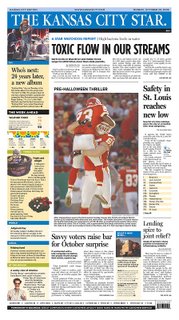Help stamp out language fraud
 Judging from the play it got around the nation, it's too late to do anything about it this year, but let's put this one in the tickler file. When it comes around in 2007, ignore it. And cudgel anybody who wants to featurize it.
Judging from the play it got around the nation, it's too late to do anything about it this year, but let's put this one in the tickler file. When it comes around in 2007, ignore it. And cudgel anybody who wants to featurize it.We're talking about the annual smoke-and-mirror job by the Morgan Quitno Press of Lawrence, Kan., which managed -- again -- to get a numbers of newspapers to fall for its alleged ranking of "America's Safest (and Most Dangerous) Cities." A few colorfully stupid examples -- Cleveland ranks 7th for danger! Safety in St. Louis reaches new lows! -- are shown at right, but they're hardly the only ones who fronted the thing:
City ranked slightly safer
(The Sun of San Bernardino, Calif.)
Is your city safe?
Torrance is ranked 2nd safest in LA County on list of largest cities
(The Daily Breeze of Torrance, Calif., which gets bonus points for this
 lede: Take a deep breath, Torrance: You are the nation's 43rd-safest city.)
lede: Take a deep breath, Torrance: You are the nation's 43rd-safest city.)We seem to have something that struck a chord in newsrooms. Unfortunately, it's not the chord the rest of the band is playing. No, it's a publishing company that's found a way to manipulate some readily available numbers into a bogus ranking that gets it some free publicity every year. Here's the hed and top from a paper that localized it:
Charlotte ranked as dangerous big city
Sometimes-criticized report puts it at No. 8
Charlotte ranks among the 10 most dangerous big cities in the country, according to a national crime report released today.
And the compilation calls the Queen City even more dangerous in 2005 than in the prior year.
The Lawrence, Kan.-based Morgan Quitno Press ranked Charlotte the eighth-most dangerous among cities with a population of at least 500,000. Overall, the city ranked 43rd among 371 cities.
That's worse than 2004, when the city ranked 10th among large cities and 57th overall.
It sounds a lot sexier to say "most dangerous" and "safest" rather than "highest per capita on the limited number of crimes we measured" and so on, but that's the problem. This isn't in any remotely valid way a measure of how "safe" or "dangerous" cities are. That's sort of, well, a "lie."
What does it mean for a city to be "safe"? Well, the per capita rates of murder, rape and car theft probably figure into it, although it's worth noting that these aren't evenly distributed in the population. (A good way to avoid being killed in a drug deal is, erm, to not sell drugs to people with guns.) But what about, say, the prevalence of auto accidents? Or the average time it would take to reach an emergency room from one? Or the likelihood that the other drivers you encounter along the way are drunk and uninsured?
Or, speaking of which, the proportion of people in the population -- when newspapers say "you" or "we," they usually mean "people who look like the reporter" -- who carry health insurance? Or the position of your water treatment plant relative to your major industrial employer's outflow pipes? Or -- well, since we mentioned Charlotte, the number of nuclear power plants within 30 miles either way? Did Cleveland pip Charlotte for a spot in the coveted Top 7 because of the chance you'll push off from a heart attack while shoveling all the snow? Or what?
Declaring safety and danger to be functions of a small set of crimes is cute, in other words, but it's narrow-minded and short-sighted in a way that ought to make newspapers suspicious. (Yes, that's next door to saying that at the least, it's overtly class-bound.) It lets us say DANGER in big type, but it doesn't help people understand anything about risk. Next time this one comes around, laugh it out of the newsroom. Morgan Quitno can buy an ad if it wants the publicity that badly.

3 Comments:
Why, thanks. We like to think it are too.
And what, fev, do think of your admirer's cancer site?
I thought the word-filter thing was supposed to keep the spam thingys out, but somebody seems to have outsmarted the word filter.
At a skim -- more time than it deserved -- I didn't see anything overtly unscientific or criminal. And it's not as amusing as the link from the stamp-collecting site, or as cool as getting the Nigerian scam letter from somebody who purports to be Abacha's widow. Or as instructive as some of Pullum's grammatical dissections of phishing expeditions.
Just another thing to procrastinate about in dissertation season. Happens to all of us.
Post a Comment
<< Home